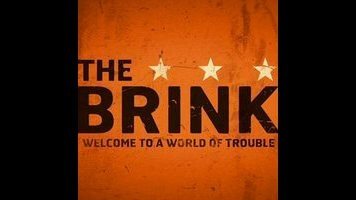Such heavy doses of plot could be troublesome; fortunately, this sucker moves. Directing the premiere, Jay Roach (who also executive produces) establishes a kinetic house style, complete with hallway walk-and-talks and cameras that glide across the White House Situation Room. Part of this feels like an attempt to stave off the tedium of powerful people talking at each other for minutes at a time, but it’s also a good match with the globetrotting activities of the show’s ensemble. At the halfway mark of its first season, The Brink stands as a well-traveled TV comedy, sending Secretary Of State Walter Larson (Robbins) on a whistle-stop tour of strategic allies, while Black and Mandvi’s characters scramble through an increasingly turbulent Islamabad. Joining them in The Brink’s farcical travelogue are drug-peddling Air Force pilot Zeke “Z-Pak” Tilson (Pablo Schreiber, making his physical resemblance to Matthew McConaughey really count) and his skittish wingman, Glenn (Eric Ladin). Z-Pak and Glenn’s between-missions high jinks are the most disposable aspects of The Brink, but the pilots justify their existence whenever they’re in the cockpit. The chroma key work might be shoddy, but the anxiety of these scenes is real.
As funny as The Brink can be, its satire lacks a certain bite. It’s being sold as a dark comedy, but its outlook isn’t nearly that bleak: Lacking the fatalism of Stanley Kubrick’s Cold War classic Dr. Strangelove or the bluntness of its spiritual successor In The Loop, The Brink doesn’t think the world is so irredeemable that it deserves to be irradiated. (And as a continuing series rather than a self-contained story, pushing the button would make for a distinctly different season two.) Its heroes are flawed, but fundamentally noble: They crusade against zero hour and usually manage to outfox the war-mongers, fanatics, and figureheads who oppose them. There are laughs to be had in the selfish actions of Walter, Alex, and Z-Pak, but the show sets them up as “Do as I say, not as I do” figures. They’re each complimented by a Jiminy Cricket, sidekicks of purer intention who verbalize the the audience’s eye rolls and assure us that not everyone in this world is as sex-obsessed as Secretary Larson or two-faced as Z-Pak. Mandvi, Ladin, and Maribeth Monroe serve as audience surrogates, and there’s a bit of a patronizing pat-on-the-head vibe to recognizing them as such.
Yet there’s just enough modulation in these second bananas to make them the secret MVPs of The Brink. Ladin brings a babyfaced innocence to Glenn, which makes him Z-Pak’s conscience as well as his personal responsibility. The determination and stiff upper lip of Monroe’s Kendra Peterson demonstrates that while Walter Larson might be the face of the State Department, Kendra is the brains. Best known as a correspondent on The Daily Show, Mandvi works the straight-man chops he’s honed as a fake newsman, balancing Black’s frantic energy with expertly deployed incredulity.
The show gets further boldness points for positioning an honest-to-goodness nation state as its nuclear hornet’s nest (an area where even In The Loop pulled its punches) and depicting at least one U.S. official as apocalypse’s No. 1 fan. But there’s still the sense that The Brink holds off where it should dig in, one where the show’s definition of edginess tops out at scatology and profanity, not good-humored real talk about the end of world. There’s smart plotting at work, and keen observational skills when it comes to showing who’s truly in power, but it takes a squishy stance on the issues at hand, a “nuclear warfare bad” perspective that makes for agreeable comedy but ineffectual satire. A sitcom about mutually assured destruction ought to feel a little bit radioactive. The Brink gets laughs, but its provocations have a brief half life.


 Keep scrolling for more great stories.
Keep scrolling for more great stories.